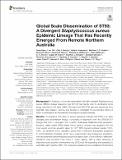Global scale dissemination of ST93 : a divergent Staphylococcus aureus epidemic lineage that has recently emerged from remote Northern Australia
Abstract
Background : In Australia, community-associated methicillin-resistant Staphylococcus aureus (MRSA) lineage sequence type (ST) 93 has rapidly risen to dominance since being described in the early 1990s. We examined 459 ST93 genome sequences from Australia, New Zealand, Samoa and Europe to investigate the evolutionary history of ST93, its emergence in Australia and subsequent spread overseas. Results : Comparisons with other S. aureus genomes indicate that ST93 is an early diverging and recombinant lineage, comprising of segments from the ST59/ST121 lineage and from a divergent but currently unsampled Staphylococcal population. However, within extant ST93 strains limited genetic diversity was apparent with the most recent common ancestor dated to 1977 (95% highest posterior density [HPD] 1973–1981). An epidemic ST93 population arose from a methicillin-susceptible progenitor in remote northern Australia, which has a proportionally large Indigenous population, with documented overcrowded housing and a high burden of skin infection. Methicillin-resistance was acquired three times in these regions, with a clade harbouring a staphylococcal cassette chromosome mec (SCCmec) IVa expanding and spreading to Australia’s east coast by 2000. We observed sporadic and non-sustained introductions of ST93-MRSA-IVa to the United Kingdom. In contrast, in New Zealand, ST93-MRSA-IVa was sustainably transmitted with clonal expansion within the Pacific Islander population, who experience similar disadvantages as Australian Indigenous populations. Conclusions : ST93 has a highly recombinant genome including portions derived from an early diverging S. aureus population. Our findings highlight the need to understand host population factors in the emergence and spread of antimicrobial resistant community pathogens.
Citation
van Hal , S J , Steinig , E J , Andersson , P , Holden , M T G , Harris , S R , Nimmo , G R , Williamson , D A , Heffernan , H , Ritchie , S R , Kearns , A M , Ellington , M J , Dickson , E , de Lencastre , H , Coombs , G W , Bentley , S D , Parkhill , J , Holt , D C , Giffard , P M & Tong , S Y C 2018 , ' Global scale dissemination of ST93 : a divergent Staphylococcus aureus epidemic lineage that has recently emerged from remote Northern Australia ' , Frontiers in Microbiology , vol. 9 , 1453 . https://doi.org/10.3389/fmicb.2018.01453
Publication
Frontiers in Microbiology
Status
Peer reviewed
ISSN
1664-302XType
Journal article
Description
ST is an Australian National Health and Medical Research Council Career Development Fellow (#1145033). Sequencing was supported by Wellcome Trust grant 098051.Collections
Items in the St Andrews Research Repository are protected by copyright, with all rights reserved, unless otherwise indicated.

